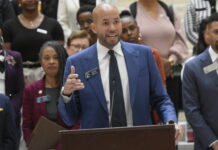
(GA Recorder) — Georgia’s transgender children and their families are hoping a last-minute lawsuit will thwart the state’s ban on gender-affirming medical treatments that kicked in Saturday.
The families of four transgender girls from Atlanta and Athens filed the suit in federal court Thursday, two days before the law went into effect. The girls, ranging from 10 to 12 years old, are in different stages of treatment and are waiting for the right time to start hormone treatment. TransParent, a group for parents of transgender children with chapters in 10 states, is also a plaintiff.
Under the new law that went into effect on July 1, healthcare providers in Georgia are not allowed to prescribe estrogen for transgender girls or testosterone for transgender boys until they turn 18. Doctors can prescribe such treatments for other reasons. Children who have already begun hormone treatment will be able to continue.
READ lawsuit here
Attorneys for the families argue that this amounts to a textbook case of sex discrimination under the 14th Amendment because the patient’s sex at birth determines whether they will be restricted from the care their doctor recommends.
“The ban infringes parents’ fundamental right to make medical decisions in the best interests of their children, and it singles out transgender minors for the denial of essential medical care, contrary to the Due Process and Equal Protection Clauses of the Fourteenth Amendment,” the plaintiffs argue in their court filing.
Several states have passed anti-trans bills in recent months, and courts have hit the pause button on some of them in just the past few weeks, including in Tennessee, Arkansas, and Florida.
The parents here are hoping Georgia will be next and the court will prevent the law from being enforced while challenges against it proceed.
The debate over the ban was among the most emotional in this year’s legislative session as transgender youths and their allies came to the Capitol to lobby against it. Despite the outcry, lawmakers passed the bill along party lines, and Gov. Brian Kemp signed it without delay rather than waiting until the end of the session.
The year before, Kemp signed another controversial bill aimed at barring transgender athletes from playing on girls’ high school sports teams.
Republican lawmakers said the health care ban is not seeking to be cruel but is necessary to address what they see as a spike in cases of gender dysphoria among minors and in gender-affirming care, which lawmakers say they may come to regret. They argue that a provision allowing doctors to prescribe puberty-blocking drugs represents a compromise, allowing minors to put off the decision to transition until they are older.
Patients, doctors, and advocates disagree. They argue that the rise in cases of transgender minors is due to a trend towards greater acceptance, which they say anti-trans laws jeopardize. Doctors also argue that puberty blockers are designed for short-term use only, and to use them as lawmakers suggest would be medically irresponsible.







